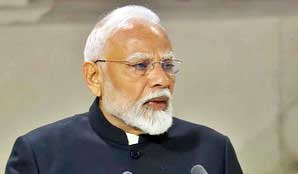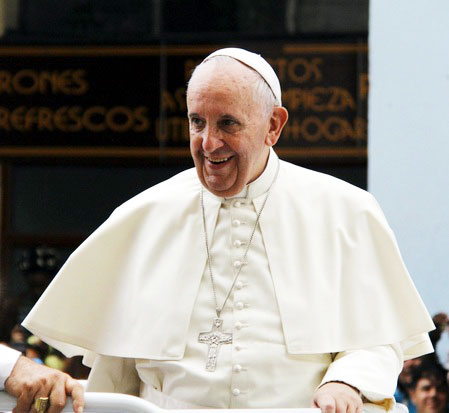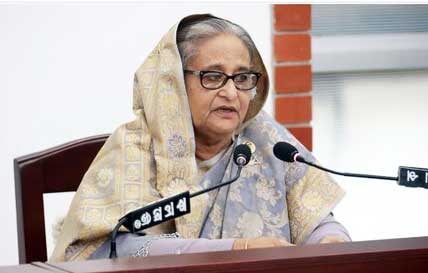India is developing AI applications for the public good and has one of the world’s largest AI talent pools, Prime Minister Narendra Modi said here on Tuesday, adding that the country is ready to share its experience and expertise to ensure that the "AI future is for Good, and for All".
Addressing the 'AI Action Summit' here, PM Modi said India is also building its own large language model (LLM), considering its diversity.
"We also have a unique public-private partnership model for pooling resources like computing power. It is made available to our start-ups and researchers at an affordable cost," informed the Prime Minister.
PM Modi further stated while the positive potential of AI is absolutely amazing, there are many biases that we need to think carefully about.
"We must build quality data sets, free from biases. We must democratise technology and create people-centric applications. We must address concerns related to cyber security, disinformation, and deepfakes. And, we must also ensure that technology is rooted in local ecosystems for it to be effective and useful," PM Modi emphasised.
AI is developing at an unprecedented scale and speed and being adopted and deployed even faster. There is also a deep inter-dependence across borders.
"Therefore, there is a need for collective global efforts to establish governance and standards, that uphold our shared values, address risks, and build trust," said the Prime Minister.
The country last month announced to launch its safe and secure indigenous AI model within six months at an affordable cost. Aligning with India's broader vision to become a global artificial intelligence (AI) hub, Finance Minister Nirmala Sitharaman, in her Union Budget speech, announced the creation of three Centres of Excellence (CoEs) in AI for education.
According to PM Modi, governance is not just about managing risks and rivalries.
"Governance is also about ensuring access to all, especially in the Global South. It is where the capacities are most lacking - be it compute power, talent, data, or the financial resources," he mentioned.
"AI can help transform millions of lives by improving health, education, agriculture and so much more. It can help create a world in which the journey to Sustainable Development Goals becomes easier and faster," the Prime Minister added.
To do this, the world must develop open-source systems that enhance trust and transparency.
On the debate of job losses due to AI, the Prime Minister said history has shown that work does not disappear due to technology.
"Its nature changes and new types of jobs are created. We need to invest in skilling and re-skilling our people for an AI-driven future," he noted.
India has successfully built a Digital Public Infrastructure (DPI) for over 1.4 billion people at a very low cost. It is built around an open and accessible network. It has regulations, and a wide range of applications to modernize our economy, reform governance and transform the lives of our people.
"We have unlocked the power of data through our Data Empowerment and Protection Architecture. And, we have made digital commerce democratic and accessible to all. This vision is the foundation of India’s National AI Mission," said PM Modi.
Today, India leads in AI adoption and techno-legal solutions on data privacy.
"We are at the dawn of the AI age that will shape the course of humanity. Some people worry about machines becoming superior in intelligence to humans. But, no one holds the key to our collective future and shared destiny other than us humans," the Prime Minister told the gathering.





Bangladesh embankment issue communicated to Centre: Tripura CM
Tripura Chief Minister Manik Saha, for the first time, breaking his silence over the construction of embankments by the Bangladesh government along the state’s international borders, on Tuesday said that the matters have been communicated to the Centre.
US, Russia, UAE, Iran condemn terrorist attack in Kashmir, express solidarity with India
Expressing their condolences over the terrorist attack in which at least 16 tourists, including two foreigners, were killed and 20 other tourists and locals injured in the Pahalgam hill station in Jammu and Kashmir's Anantnag district on Tuesday, US, Russia, the UAE and Iran have condemned the attack and expressed solidarity with India in its fight against terrorism.
‘Entire country stands united against terror’: Sonia Gandhi on Pahalgam attack
Chairperson of the Congress Parliamentary Party (CPP) Sonia Gandhi said on Tuesday that the entire country stands united against the terror attack on tourists in Pahalgam, Kashmir.
21st century will be prosperous if India-US work together: JD Vance
US Vice President J.D. Vance on Tuesday said that the 21st century will be prosperous if India and the US work together.
1.42 lakh girl students received self-defense training in Tripura: CM Saha
Tripura Chief Minister Manik Saha on Tuesday said that the foremost aim of the BJP government is to provide quality and proper education to the students and the infrastructure of around 123 schools would be developed along with the filling up of the vacancies of teaching and non-teaching staff.
Kerala: Pinarayi Vijayan & LoP Satheesan condemn Pahalgam terror attack
Kerala Chief Minister Pinarayi Vijayan and Leader of Opposition V.D. Satheesan condemned the terror attack in Pahalgam in J&K’s Anantnag district on Tuesday.
16 killed in Pahalgam terror attack, Home Minister chairs security review meeting, security operations launched
At least 16 tourists, including two foreigners, were killed and 20 other tourists & locals injured in a terror attack in Pahalgam hill station in Jammu and Kashmir's Anantnag district on Tuesday, even as Union Home Minister Amit Shah reached Srinagar to chair an urgent review meeting
Pawan Khera condemns Pahalgam terror attack, urges govt to call all-party meeting
Congress spokesperson Pawan Khera strongly condemned the terror attack on tourists in Pahalgam, Jammu and Kashmir, and called on the government to take immediate action.